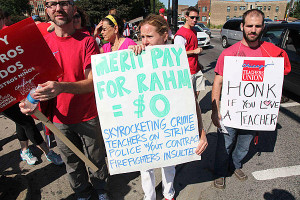Being a teacher in Chicago (at a public school no less!) is an interesting task these days. I sit in my office at the University of Illinois at Chicago and look down (literally, not figuratively) at all the teachers on the street, dressed in red, demanding a new contract. I’m struck by their perseverance, the hard work they’ve done in the past for the kids of Chicago, and, like it or not, the power of a union.
Like almost all of our students, I was raised in an anti-union environment, although that’s too strong a phrase. Our times are not necessarily anti-union, but our categories of difference have been colored strongly by factors other than class, and most especially by race and religion. Class hasn’t been much a talking point for 40 years (Jefferson Cowie and others have tried to explain why). And the only blip in that truth was the Occupy Wall Street movement, which petered out last year and has remained off the charts ever since. Elizabeth Warren is out there, and Obama has occasionally talked about the maldistribution of wealth, but it’s not untrue that class distinctions have not been the predominant recognized divisions in American life since the 1970s.
That has left unions in a lurch. They have been colored as money-grubbing lobbyist institutions. They have been dissected (by me, no less!) for not living up to barometers of racial equality in the 1950s and 1960s. And they’ve been put on the defensive, having to justify their existence in the face of folks like Republican Wisconsin Gov. Scott Walker and now Democratic Chicago Mayor Rahm Emanuel. They’ve lost the battle of rhetoric and they are struggling now, in the streets, to get it back. Who knows if they’ll succeed.
When I give my lecture on late 19th-century labor activities, then, I remind myself that my students might not understand what it is that unions do (perhaps I underestimate my students?), and also why unions came into existence in the first place. The context, of course, was the Industrial Revolution, but I always begin my lecture with a simple question: “Who here has heard of the weekend?” And then: “Anyone know where it comes from, and why?” Ah, the power of a union.





good post. website design bangalore